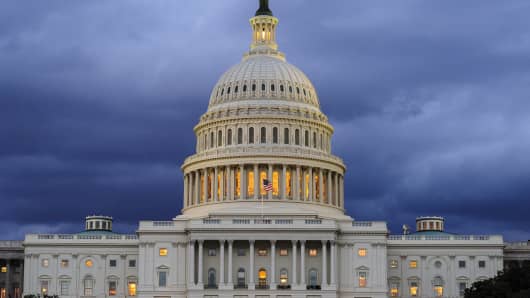The House has passed a huge stopgap spending bill to keep the government open through the end of September, sidestepping any threat of a government shutdown.
The bipartisan 318-109 vote sends the measure President Barack Obama to be signed into law.
The measure would fund the day-to-day operating budgets of every Cabinet agency through Sept. 30, provide another $87 billion to fund overseas military operations in Afghanistan and Iraq and maintain a pay freeze for federal workers.
The measure leaves in place automatic spending cuts of 5 percent to domestic programs and 8 percent to the Pentagon that will mean job furloughs for hundreds of thousands of federal workers but takes steps to ease the impact of those cuts to food inspection and college assistance for active duty military.
In a separate vote, Congressional Republicans passed a Tea Party-flavored budget plan that promises sharp cuts in safety-net programs for the poor and a clampdown on domestic agencies, in sharp contrast to less austere plans favored by President Obama and his Democratic allies.
The measure, similar to previous plans offered by Budget Committee Chairman Paul Ryan, R-Wis., demonstrates that it's possible, at least mathematically, to balance the budget within a decade without raising taxes.
But its deep cuts to programs for the poor like Medicaid and food stamps and its promise to abolish so-called "Obamacare" are nonstarters with the president, who won re-election while campaigning against Ryan's prior budgets.It passed on a mostly party-line 221-207 vote.
The House measure advanced as the Democratic Senate debated its first budget since the 2009 plan that helped Obama pass his health care law.
The dueling House and Senate budget plans are anchored on opposite ends of the ideological spectrum in Washington, appealing to core partisans in the warring parties that are gridlocked over persistent budget deficits. Obama is exploring the chances of forging a middle path that blends new taxes and modest curbs to government benefit programs.
The Ryan measure revives a controversial plan to turn the Medicare programs for the elderly into a voucher-like system — for future beneficiaries born in 1959 or later — a program in which the government would subsidize the purchase of health insurance instead of directly paying hospital and doctor bills.
Critics say the idea would mean ever-spiraling out-of-pocket costs for care, but Ryan insists the plan would inject competition into a broken system.
The cuts to domestic agencies like the FBI, Border Patrol and National Institutes of Health could approach 20 percent when compared with levels agreed to as part of a hard-fought budget deal from the summer of 2011. That could run the already troubled appropriations process — it features 12 spending bills that are supposed to be passed by Congress each year — into the ground.


